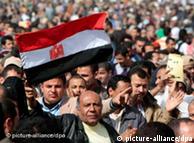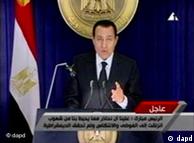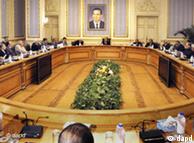MIDDLE EAST | 06.02.2011
Egyptian opposition unsatisfied in talks with government
Leaders among Egypt's opposition groups gave a disappointing review of talks with Vice President Omar Suleiman on Sunday, despite the government's promise to form a committee to review the country's laws and constitution.
Leading opposition figure Mohamed ElBaradei called the negotiation process "opaque" and said "nobody knows who is talking to whom at this stage."
"It is all managed by the military… and that is part of my problem," he told American broadcaster NBC. "The president is a military man, the vice president is a military man, the prime minister is a military man."
Leading members of the Muslim Brotherhood, Egypt's largest opposition group, said the government was showing "good intentions" but no willingness to make solid changes.
 The demonstrators demand Mubarak should step down immediately"We went in with a key condition... and that was that (Mubarak) needs to step down in order to enter a democratic phase," senior Brotherhood member Abdel Monem Aboul Fotouh told broadcaster Al Jazeera. "If they are willing and if they are serious, they would have already taken many, many steps."
The demonstrators demand Mubarak should step down immediately"We went in with a key condition... and that was that (Mubarak) needs to step down in order to enter a democratic phase," senior Brotherhood member Abdel Monem Aboul Fotouh told broadcaster Al Jazeera. "If they are willing and if they are serious, they would have already taken many, many steps."Aboul Fotouh said Mubarak must dissolve parliament, release all political prisoners and end the state of emergency, and that "until then, the youth will remain on the streets and at the same time, discussions will continue."
Constitutional reform
The negotiations began on Sunday with a meeting between Suleiman and leaders of several opposition groups, including the Brotherhood. The talks are the first known discussions between the government and the Brotherhood, which is officially banned but tolerated in Egypt.
Government spokesman Magdi Radi said the two sides agreed to form a committee of judges and politicians "to study and propose constitutional amendments and required legislative amendments… before the first week of March."
Leaders also discussed ending the state of emergency, under which authoritarian President Hosni Mubarak has ruled for 30 years, and more freedom of information on the Internet.
Banks reopen
German Foreign Minister Guido Westerwelle said Sunday that the West stands by the reform movements in Egypt and other Arab countries but added that extremists should not be allowed to seize on the upheaval to impose radical views.
"We want democrats to be able to articulate their interests," he said at the Munich Security Conference. "We do not want extremists with their intolerant ideas taking this moment of opportunity to propose radical ideas."
Meanwhile in Cairo, a steady stream of employees have flowed into Cairo's financial district and customers queued to access their accounts on Sunday, the first day for the country's banks to open after a week-long closure due to political protests.
Bankers are bracing for chaos in dealing rooms with foreign investors and local businessmen fleeing the Egyptian pound after the street protests paralyzed much of the economy and dried up important sources of foreign exchange. With the political crisis still unresolved, banks may see panicky withdrawals of cash by Egyptians worried that access to their deposits could be restricted again.
 Mubarak said he would not run for re-election in SeptemberA home for Mubarak
Mubarak said he would not run for re-election in SeptemberA home for MubarakThe political turmoil in Cairo loomed large over international meetings in Munich, Germany, where Obama's special envoy Frank Wisner said Mubarak should stay in office during a democratic transition and called the Egyptian president an "old friend" whose "leadership is critical."
But officials in Washington quickly distanced themselves from Wisner's remarks, saying he spoke as a private citizen.
ElBaradei said the United States was sending mixed messages, and that Wisner's statements "created a lot of confusion, a lot of disappointment."
If Mubarak goes into exile, members of Germany's ruling coalition have said they would be willing to welcome the president to Germany. The New York Times reported Saturday that scenarios calling for Mubarak to travel to Germany, where in the past he has received medical treatment, where under discussion.
The German government spokesperson for security Elke Hoff told the Bild am Sonntag newspaper that she would welcome an early departure by Mubarak if this would help to stabilize the situation in Egypt.
"By this I don't mean we would grant political asylum," she added.
Author: Andrew Bowen, (AP, AFP, Reuters, dpa)
Editor: Andreas Illmer
dw


No comments:
Post a Comment